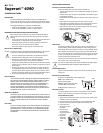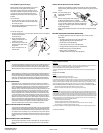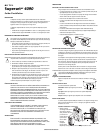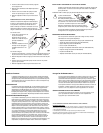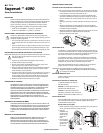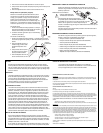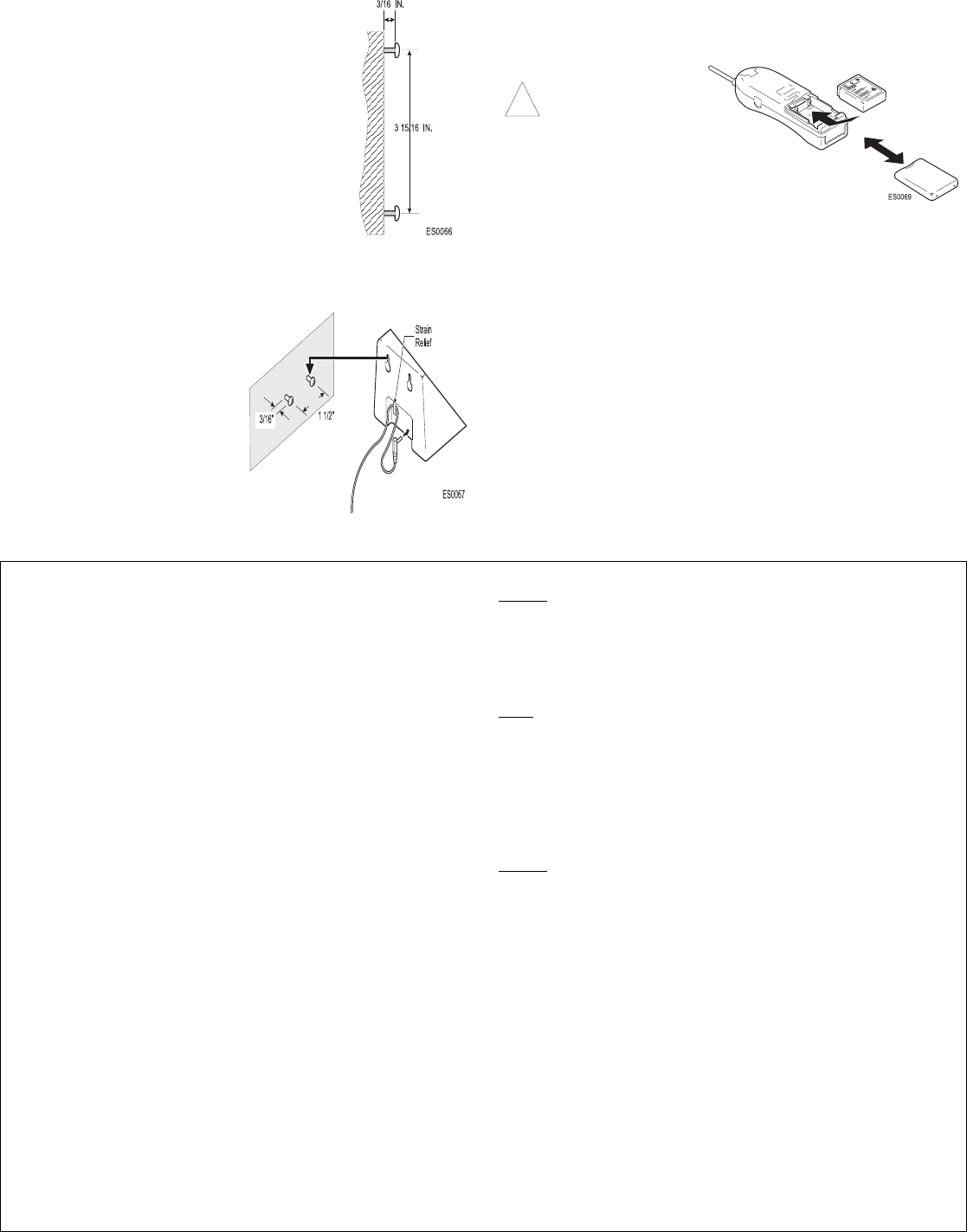
Direct Wall Mounting (Base and Charger)
Select a location away from electrical cables, pipes or other
items behind the mounting location that could cause a
hazard when inserting screws into the wall. Make sure the
wall material is capable of supporting the weight of the base
or charging unit. Use #10 screws with anchoring devices
suitable for the wall material on which the charging unit will
be placed.
To mount the base:
1. Insert two mounting screws 3 15/16 inches apart. Allow
about 3/16 of an inch between the wall and screw heads
for mounting the phone
2. Proceed with the installation by following steps 2 to 6 of
Standard Wall Mounting (Base).
To mount the charging unit:
1. Insert two mounting screws 1 1/2 inches apart. Allow about 3/16 of an inch between
the wall and screw heads for
mounting the phone.
2. Plug the AC adapter into the
charging unit and wrap the cord
around the strain relief.
3. Place the base on the posts of the
wall plate and push down until it is
firmly seated.
4. Plug the AC adapter into a 120
VAC wall outlet.
Handset Battery Installation and Charging
Install one of the two batteries (supplied) in the Handset as shown in the illustration.
Charge the battery without interruption for 15 to 20 hours before using the phone for the
first time.
CAUTION: Use only the battery (part #
9132-090-807-NA) supplied
with this phone.
When the Handset battery needs recharging,
the
BATT LOW indicator appears in the display.
The Handset also beeps once every 3 seconds in Talk mode, or
every 15 seconds in Standby mode. Return the Handset to the
charging unit for charging or replace the Handset battery with
another charged battery.
See the Superset 4090 User’s Guide for more information on charging the Handset
batteries.
Optional Accessories and Replacement Parts
For following optional accessories and replacement parts, contact your PBX
Administrator:
• AC Adapter for Charging Unit (Part No. 9132-090-801-NA)
• Spring-type Belt Clip (Part No. 9132-090-802-NA)
• Headset (Part No. 9132-090-803-NA)
• Leather Carrying Case (Part No. 9132-090-804-NA)
• Charging Unit with AC Adapter (Part No. 9132-090-805-NA)
• Wall Mount Plate (Part No. 9132-090-806-NA)
• Battery (Part No. 9132-090-807-NA)
• AC Adapter for Base Unit (Part No. 9132-090-808-NA)
!
Range
The Superset 4090 telephone is designed to achieve the maximum possible operating range
in accordance with the highest specifications set forth by the FCC. However, because the
phone uses radio frequencies, the environment in which the it is used may limit the range. Try
different locations for the base and choose the one that gives the best signal to the Handset.
Privacy
Cordless telephones are radio devices. Communication between the Handset and base of the
Superset 4090 telephone is accomplished by means of radio waves, which are broadcast
over the open airways. Because of the inherent physical properties of radio waves, communi-
cations can be intercepted by radio receiving devices, including other cordless telephones.
Consequently, any communications using the Superset 4090 telephone may not be private.
Radio Interference
Radio interference may occasionally produce buzzing and humming in the Handset, or
clicking noise in the base. This interference is caused by an external source such as a TV,
computer, display monitor, refrigerator, vacuum cleaner, fluorescent lighting, or electrical
storm. THE TELEPHONE IS NOT DEFECTIVE. If these noises continue and are too
distracting, check for nearby electrical devices that may be causing the problem. For extra
protection against potential interference, avoid plugging the base into a circuit that also
powers a major appliance. Be certain the antenna is kept in the vertical position. In the
unlikely event that other voices or distracting transmissions are consistently heard while
on a call, the Handset may be receiving radio signals from another source of interference.
If this type of interference persists, use the CHAN button on the Handset to change to a
different channel. Finally, be aware that some cordless telephones operate at frequencies
that may cause interference to nearby electrical devices. To minimize or prevent such
interference, the base of the cordless telephone should not be placed near or on top of an
electrical device. If interference is experienced, moving the cordless telephone farther
away from the electrical device will often reduce or eliminate the interference.
More than one Cordless Telephone
To use more than one cordless telephone in the same office or other area, they must operate
on different channels. The Superset 4090 automatically selects the clearest available chan-
nel during a call and provides sufficient channels for up to 25 simultaneous calls in any given
area. If static or noise is heard during a call, use the CHAN key to select a clearer channel.
No minimum spacing is required between Base Units located in the same area, unless the
number of units exceeds 15. If more than 15 units are in use, space them as far apart as
possible.
Switching Base Units and Handsets
The Handsets are programmed to work with a specific Base Unit. You cannot switch to a
different Handset or Base Unit without having it reprogrammed by an authorized MITEL
technician.
NOTICE TO CANADIAN CUSTOMERS
Interference
Operation is subject to the following two conditions: (1) this device may not cause interference, and (2) this device must
accept any interference, including interference that may cause undesired operation of the device.
Privacy of communications may not be ensured when using this telephone.
This Class A digital apparatus meets all requirements of the Canadian Interference-Causing Equipment Regulations,
ICES-003.
NOTICE TO U.S. CUSTOMERS
Telecom
This equipment complies with Part 68 of the FCC Rules.
The Handset provided with this equipment is hearing aid compatible.
On the bottom of this equipment is a label that contains, among other information, the FCC registration number for this
equipment. If requested, the FCC registration number of this equipment and the FCC registration number of the Mitel
system to which this equipment is connected, shall be provided to the telephone company. This equipment is not for con-
nection to the telephone network or public coin phone service. It is only for use when connected to Mitel systems.
WHEN PROGRAMMING EMERGENCY NUMBERS AND (OR) MAKING TEST CALLS TO EMERGENCY NUMBERS
1. Remain on the line and briefly explain to the dispatcher the reason for the call.
2. Perform such activities in the off-peak hours, such as early morning or late evenings.
Interference
Note: This equipment has been tested and found to comply with the limits for a Class A digital device, pursuant to Part
15 of the FCC Rules. These limits are designed to provide reasonable protection against harmful interference in a resi-
dential installation. This equipment generates, uses and can radiate radio frequency energy and, if not installed and used
in accordance with the instructions, may cause harmful interference to radio communications. However, there is no guar-
antee that interference will not occur in a particular installation. If this equipment does cause harmful interference to radio
or television reception, which can be determined by turning the equipment off and on, the user is encouraged to try to
correct the interference by one or more of the following measures:
• Reorient or relocate the receiving antenna.
• Increase the separation between the equipment and the receiver.
• Connect the equipment into an outlet on a circuit different from that to which the receiver is connected.
• Consult the dealer or an experienced radio/TV technician for help.
Any changes or modifications not expressly approved by Mitel could violate the users authority to operate the device.
FCC Identification: AMWUD807
”
9132-910-002-NA, Issue 2 ©,™ Trademark of MITEL Corporation
© 1999 MITEL Corporation Printed in Canada All rights reserved.



